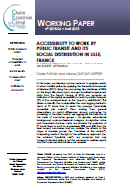
par Benjamin Dequiedt et Emmanuel Servonnat
(article disponible en anglais uniquement)
In this paper, we investigate how risk and risk aversion influence the fertilisation behavior of farmers. We show analytically that a decreasing variance of yield along with nitrogen inputs encourages risk averse farmers to apply larger quantities of fertilizers compared with risk neutral behavior. Then, we use data concerning three departments in France (Deux-Sèvres, Seine-Maritime and Eure-et-Loir) to determine (i) crop yield response function to N fertilizers and (ii) risk aversion behavior of farmers on the basis of their actual fertilizers applications. We find that risk averse farmers represent 29,7% of farmers while risk seeking ones represent 35,5%. Risk aversion behavior is associated with an additional application of 29 kg/ha compared with risk neutral behavior which represents an average loss of 76 euros/ha. We show that the reduction of abatement linked to risk aversion behavior should appear only when crop yield variance is convex with respect to N fertilizers. Lastly, our results show that an insurance covering yield variability could be foreseen as an interesting tool to mitigate emissions.
KEYWORDS . Risk aversion . Emissions Tax . Mitigation Insurance . Fertilisation . Agriculture .
